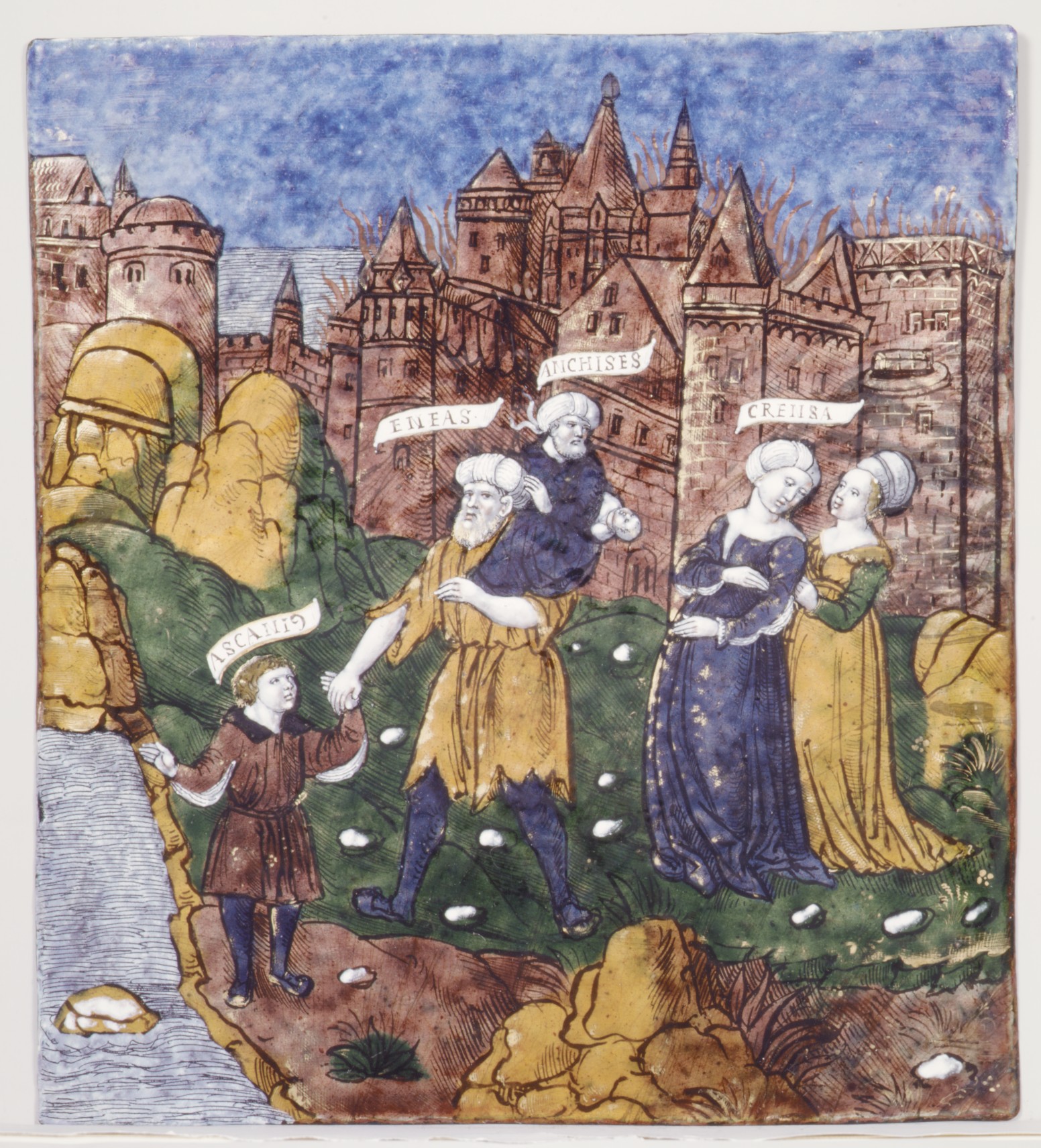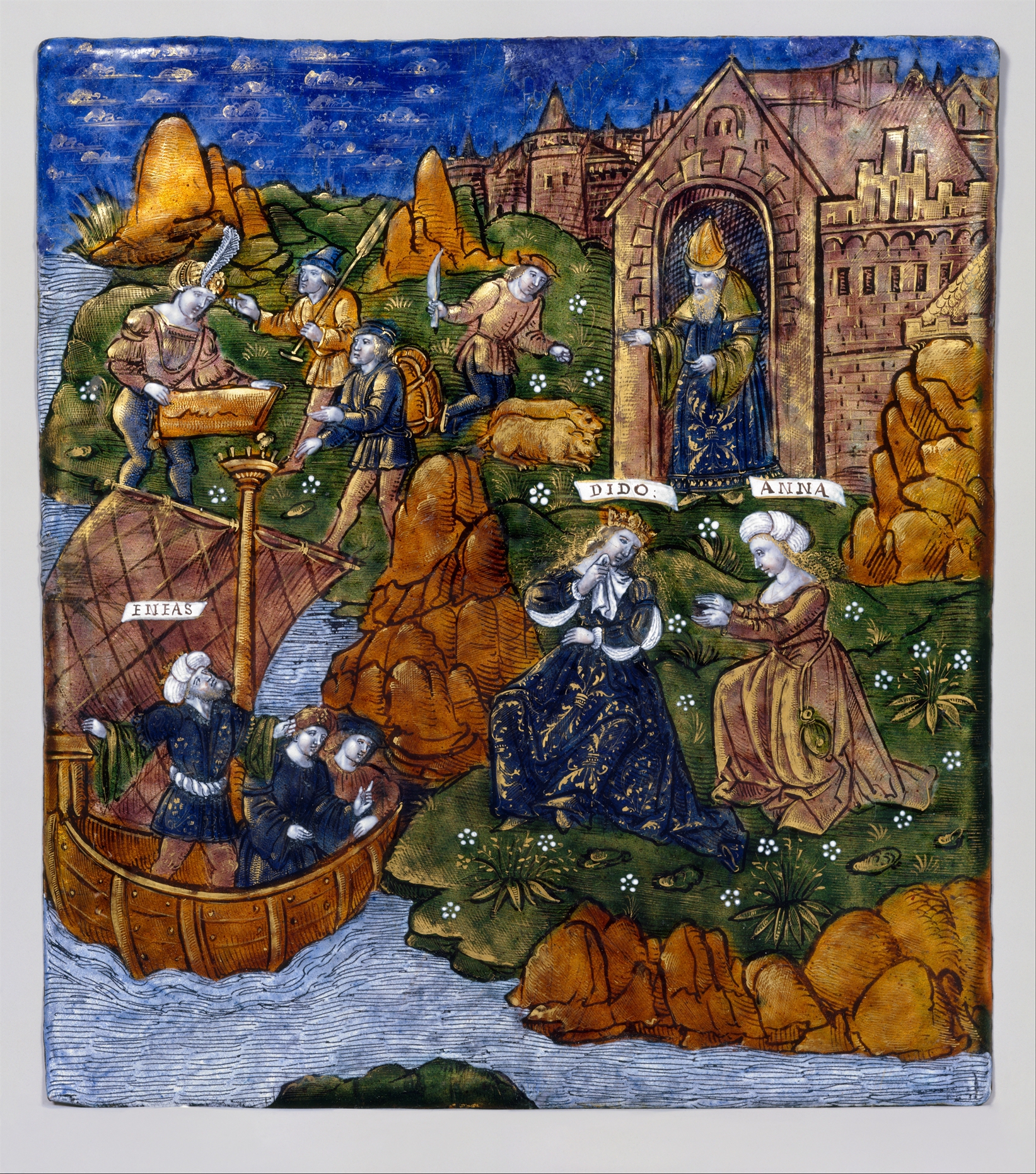In all the myths of the empire, few figures are as important —and as fascinating—as Aeneas. Known as the pious warrior who fled the burning ruins of Troy to start a new legacy in Italy, Aeneas remains the mythological figure who is a mixture of East and West. He is the one whose story starts as a Greek tragedy and ends as a Roman destiny. More than just a wandering hero, he became a cornerstone for Roman identity, an ancestor to kings and emperors, and the central figure in one of the greatest epics ever written: Virgil’s Aeneid.

The Divine Origins
Aeneas was no ordinary man. His father was Anchises, a Trojan prince, and his mother was none other than Venus, the Roman goddess of love (Aphrodite in Greek mythology). This divine lineage gave him both favor and burden. As a cousin to Hector and Paris, he belonged to the highest echelons of Trojan nobility, yet his fate extended far beyond the doomed city’s walls.
Even before The Aeneid, he appeared in Homer’s Iliad. There, he is mentioned as a respected warrior who is repeatedly saved by the gods, hinting at a future destiny that surpasses mere battlefield glory. These early tales plant the seeds for his transformation from a minor character in Greek myth to the legendary founder of Roman greatness.
The Fall of Troy
When the Greeks finally breached Troy through the deception of the wooden horse, Aeneas was among the last defenders. Despite overwhelming destruction, he refused to abandon his family. He carried his aged father Anchises on his shoulders, led his young son Ascanius by the hand, and was followed by his wife Creusa, who, tragically, was lost in the chaos.
This scene, immortalized in countless artworks, captures the essence of pietas, the Roman virtue of duty to family, gods, and country. Aeneas’s piety is what distinguishes him from other mythic heroes. He doesn’t fight for glory; he survives for a higher purpose. As Troy burned, Aeneas was already being shaped into something more than a refugee—he was becoming the vessel of Rome’s future.

A Long Journey Toward Destiny
His voyage from Troy to Italy was a voyage with countless adventures, many of which follow simiilar structure of Homer’s Odyssey. Yet his journey is not one of personal enrichment or discovery; it is shaped by fate (fatum) and divine prophecy. The gods, especially Jupiter and Venus, have ordained that Aeneas will found a new Trojan people in Italy. His fleet first lands in Thrace, then Delos, Crete, and the Strophades Islands, each location bringing omens or perils. One of the most memorable and fateful stops is Carthage, where Aeneas meets Queen Dido.
Here, Aeneas almost ended his journey. He and Dido fall deeply in love, and for a time, he forgets his mission. But the gods intervene. Mercury, sent by Jupiter, reminds Aeneas that his destiny lies not in Carthage but in Italy. With great sorrow, he departs, and Dido—betrayed and heartbroken—commits suicide, cursing him and his descendants. This act lays the mythical groundwork for the later enmity between Rome and Carthage, culminating centuries later in the Punic Wars.

Another turning point in the journey is his descent into the Underworld, a powerful episode in Book VI of The Aeneid. There, guided by the Sibyl of Cumae, Aeneas confronts the souls of the dead, including Dido. He meets his father, Anchises, once more, who reveals to him a stirring vision of Rome’s future: of Romulus and Remus, of Julius Caesar, and of Augustus, who will bring a golden age. This divine prophecy affirms Aeneas’s mission—not as a conqueror, but as the bearer of civilization’s torch.
The War in Latium
Eventually, Aeneas and his followers land on the shores of Latium in central Italy. There, he is welcomed by King Latinus, who offers him his daughter Lavinia in marriage, recognizing the foreign hero as a man of destiny. But Lavinia was already promised to another: Turnus, leader of the Rutulians. This leads to war, not unlike the one Aeneas left behind. Despite his yearning for peace, Aeneas is once again drawn into conflict. The battles are fierce and deadly, involving gods, prophecies, and brutal duels. Aeneas’s transformation from refugee to warrior is now complete, as he fights not for survival, but for the future.
The climax comes when Aeneas confronts Turnus in single combat. Wounded and defeated, Turnus begs for mercy. For a brief moment, Aeneas hesitates—but then, seeing the belt of the slain Pallas (his young ally and friend) on Turnus’s body, he is seized by rage and kills him. This act, controversial and chilling, reflects the constant struggle between pietas and vengeance. It reminds readers that even the most virtuous heroes are still human, and that the founding of Rome was not without bloodshed.
Aeneas’s Legacy and the Birth of Rome
After the war, Aeneas marries Lavinia and founds the city of Lavinium, named after her. His son Ascanius, also known as Iulus, goes on to found Alba Longa, a city that becomes the seat of Trojan descendants for generations. It is from this line that Romulus and Remus, the legendary founders of Rome, are born.
Thus, Aeneas is not only the link between Troy and Rome but also the mythical ancestor of the Julian family, to which Julius Caesar and Emperor Augustus belong. It is no coincidence that Virgil wrote The Aeneid during Augustus’s reign—Aeneas served as a political and moral symbol, legitimizing the emperor’s divine right to rule and framing Rome’s empire as a divinely ordained mission.

A Hero Written in Destiny
Aeneas is more than a character in myth—he is the embodiment of Roman ideals. His piety, his obedience to fate, and his willingness to endure suffering for a greater cause made him the perfect Roman hero. Through The Aeneid, his story became a national epic, shaping the way Romans understood themselves and their place in the world.
Even today, Aeneas’s journey—from Trojan ashes to Italian soil—echoes in literature, art, and politics. He is a hero not because he wanted glory, but because he bore the weight of destiny and built the foundation of a civilization meant to last forever.
Hello, my name is Vladimir, and I am a part of the Roman-empire writing team.
I am a historian, and history is an integral part of my life.
To be honest, while I was in school, I didn’t like history so how did I end up studying it? Well, for that, I have to thank history-based strategy PC games. Thank you so much, Europa Universalis IV, and thank you, Medieval Total War.
Since games made me fall in love with history, I completed bachelor studies at Filozofski Fakultet Niš, a part of the University of Niš. My bachelor’s thesis was about Julis Caesar. Soon, I completed my master’s studies at the same university.
For years now, I have been working as a teacher in a local elementary school, but my passion for writing isn’t fulfilled, so I decided to pursue that ambition online. There were a few gigs, but most of them were not history-related.
Then I stumbled upon roman-empire.com, and now I am a part of something bigger. No, I am not a part of the ancient Roman Empire but of a creative writing team where I have the freedom to write about whatever I want. Yes, even about Star Wars. Stay tuned for that.
Anyway, I am better at writing about Rome than writing about me. But if you would like to contact me for any reason, you can do it at contact@roman-empire.net. Except for negative reviews, of course. 😀
Kind regards,
Vladimir
